BLEEDING PLANTS, WHAT ABOUT RABBITS?
Bleeding Is Okay
Everyone wants to prune this time of year. And rightly so. It’s a good time to prune most trees, shrubs, and vines, as it was a couple of months ago and, looking forward, will be until about when these plants come into bloom. Or, finished blooming, in the case of those plants whose pruning gets delayed until after we all get to enjoy their early blossoms.
A reader wrote me about her Japanese maple, which needed to have one of its multi-trunks cut off. Should she do it now or in autumn? If lopped back now, would the tree bleed to death? Would the gaping wound get infected, possibly leading to the demise of the whole tree?
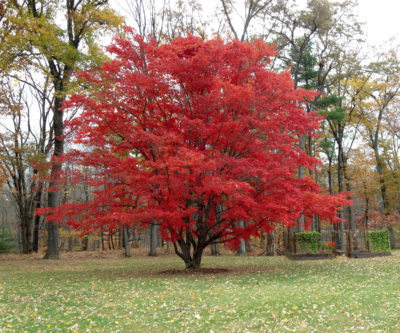
Japanese maple in fall
Bleeding sap generally does more harm to gardeners’ psyches than to plants’ physiologies. My grape and hardy kiwi vines bleed when I prune them this time of year, with no harm done. So why worry about harm to a maple?
(The bleeding of grapevines that climb the arbor over my patio does have one downside. It’s very pleasant to sit outdoors on that patio on warm, spring days; it’s very unpleasant to sit where sap drips on my head.)
Root pressure of water being forced up the vines is what makes grape and kiwi vines bleed. Once leaves unfold, they take up that pressure and bleeding ceases.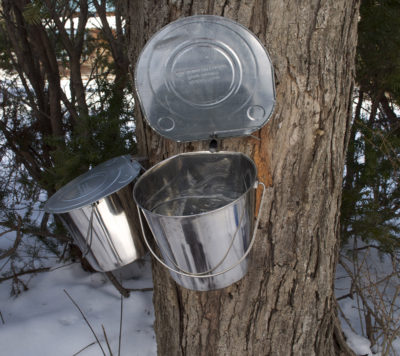
Root pressure is not what forces sap (which sounds more benign than “bleeding”) out of wounds of maple trees. With maples, cooling temperatures cause gas bubbles in xylem cells (the inner ring of trees’ cells in which liquid is conducted upwards from the roots) to shrink and to dissolve. Something’s got to fill that newfound space, so more liquid is sucked up from the roots and into the cells. As temperatures drop further, ice forms and gases are locked within the developing ice. Come morning, pressure builds in the cells as rising temperatures melt the ice and release the gases. The expanding liquid is forced out any holes in the bark, whether from a maple sap spile or from a pruning wound.
Although maples bleed for a different reason than do most other plants, the bleeding itself causes no harm to the plants. The reason small maple trees, with trunks narrower than 6 inches in diameter, should not be tapped is because the wound left by the tap hole extends within the trunk beyond the hole; sap will never again travel past the wounded area. A tap hole is large in relation to the size of a small tree’s trunk, so significantly restricts liquid flow.
Of course, there’s no need to conduct sap up a trunk that’s been lopped off. So, Barbara, go ahead and prune, now, when the gaping wound can soon begin to heal. Autumn, which leaves a gaping wound exposed to the elements and pests until spring, would be a very bad time to prune.
A Wabbit!!!!
I looked out the window awhile ago to see a rabbit crouched against a backdrop of pure, white snow. How cute. NOT! It’s the same old story. Farmer McGregor and Peter Rabbit, and now farmdener me and some other rabbit.
A few days previously I had noticed that some bark had been nibbled off the pencil-thick “trunks” of some young, grafted trees — the handiwork of those awful furballs. That nibbling probably won’t kill the small plants but will set them back a year, or more, if the nibbling kills the scion down to the graft.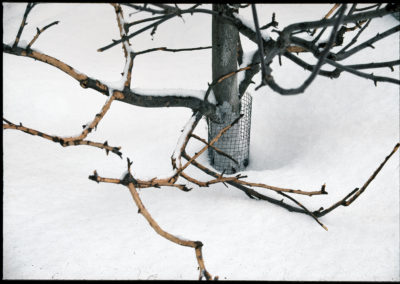
As for the rabbit and its probable kin, I’m setting traps. Unfortunately, my Peter Rabbit seems to enjoy my plants more than anything I put in the trap.
Rabbit, At Bay
I’ve kept my Peter Rabbit at bay from all my older trees this winter with diligence and hardware cloth and or commercially available plastic spiral tree guards. The protection goes 2 feet above ground, or higher, not that a rabbit could reach that high — except when there’s snow to give it “a leg up.” The light-colored spirals also protect the thin barks of young trees from sunscald, which results when sunny, cold winter days warm the bark, whose temperature then plummets as the sun drops below the western horizon.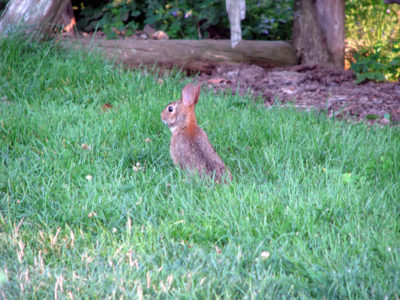
I remove all the spirals in spring so insects can’t find shelter from birds beneath the spirals.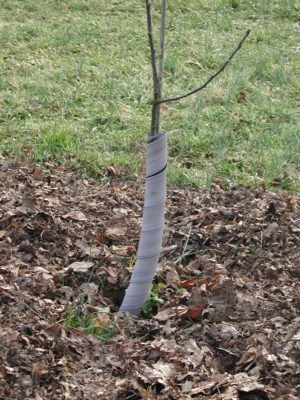
Monthly, throughout winter and into early spring, I also sprayed plants with Bobbex, a mix of “putrescent whole egg solids,” garlic, and cloves that is repellant to rabbits, as well as deer (and me).
And finally, there’s Sammy, my trusty dog who would chase away any rabbits if he happened to be awake, happened to be on the right side of the house, and happened to see them.

